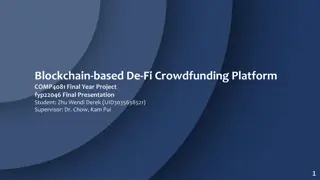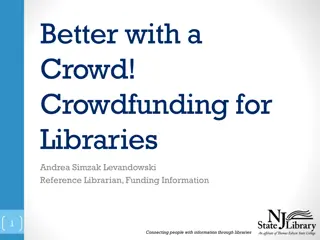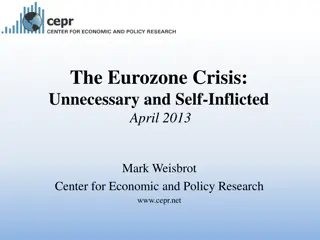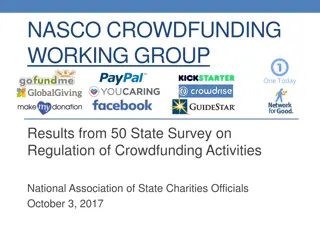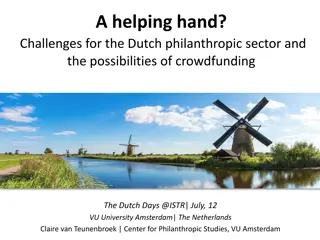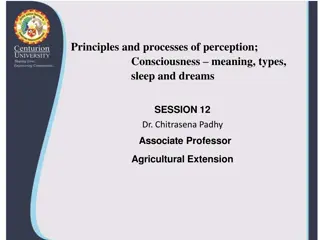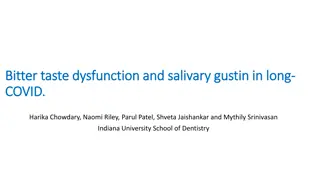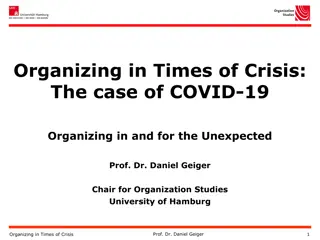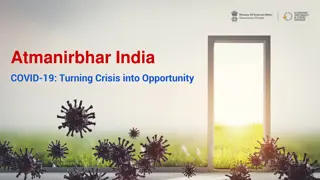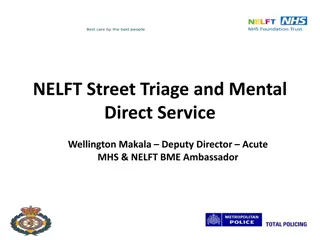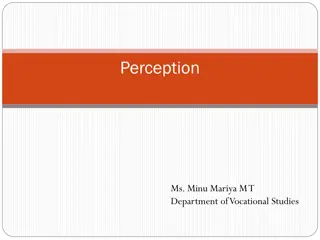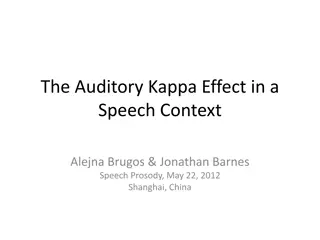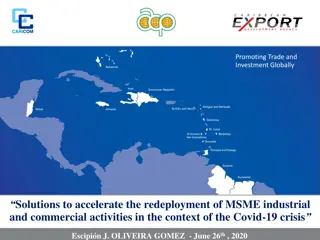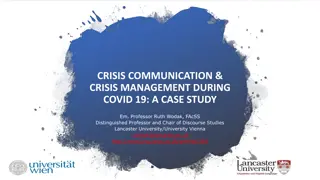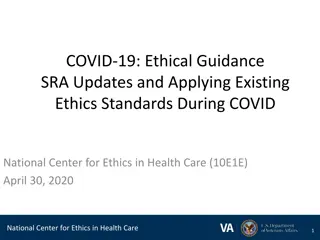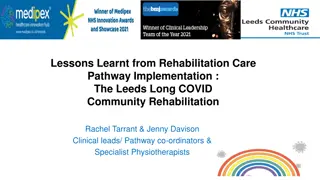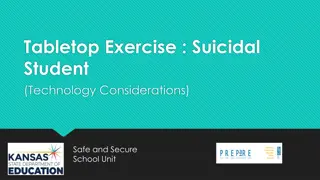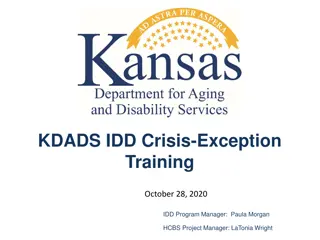Perception of Healthcare Professionals on Crowdfunding in COVID-19 Crisis in India
This study aims to evaluate the awareness and perception of healthcare professionals in India regarding crowdfunding platforms and their role in providing financial assistance during the COVID-19 pandemic. With a focus on the impact of out-of-pocket expenses on healthcare, the research investigates the potential of crowdfunding as a solution. The methodology involves an online survey of healthcare professionals and a review of crowdfunding platforms engaged in COVID-19 relief efforts.
Download Presentation

Please find below an Image/Link to download the presentation.
The content on the website is provided AS IS for your information and personal use only. It may not be sold, licensed, or shared on other websites without obtaining consent from the author. Download presentation by click this link. If you encounter any issues during the download, it is possible that the publisher has removed the file from their server.
E N D
Presentation Transcript
COVID-19 Calamity Awareness and perception of healthcare professionals regarding crowdfunding and role of crowd-funding platforms in India Presented by: Dr Pooja Bishnoi (PG/19/60) Under the guidance of : Dr Rupsa Banerjee Assistant Professor, IIHMR, Delhi
Introduction Approximately 80% of the Indian populationlacks health insurance1 and also government-initiated healthcare plans are scarce. As per NHA, OOPE contribute to approximately 63.2% out of overall health spending in India.2 The second wave of the COVID-19 pandemic in India has put unimaginable pressure on health infrastructure and has resulted in OOPE to meet hospitalization and treatment expenses especially in the private sector. The availability and access to health care within the overall public sector appear to be insufficient to match up with the growing needs of the population, in pandemic era.3 Crowd-funding is a method of funding a project or a social cause by raising money from multiple people (crowd) for a standard goal.
Purpose of study Research questions Can crowd-funding be a solution in providing financial assistance during COVID-19 pandemic? What is the perception of healthcare professionals regarding crowd-funding platforms in COVID-19 crisis ? Aim To evaluate the perception of healthcare professionals regarding crowdfunding platform and to assess the role of crowdfunding campaign in COVID-19 crisis Primary objective To find out the awareness of healthcare professional regarding crowd-funding in COVID-19 crisis Secondary objective To understand the functioning of various Indian Crowd-funding Platforms related to COVID-19 relief. To find out the perception of healthcare professionals regarding crowdfunding in covid pandemic.
Methodology Study design: Cross sectional descriptive study. Study setting: The study was done in two parts: Online survey of healthcare professionals across India and Review of crowdfunding platforms (CFPs) undertaking COVID-19 relief campaigns in India Selection criteria: For online survey Since no previous literature was found reporting our outcome variable of interest, assumed the awareness regarding crowdfunding among healthcare professionals to be 50%, yielding a sample size of 100, assuming 95% confidence and 10% absolute precision. For review Survey outcome, availability of information, locational presence, scale and type of crowd. Top 100 campaigns where more than 50% of the target funds were raised.
Sampling method: For online survey Snowball sampling For review All CFPs meeting the selection criteria Data collection tools: Online Survey form (in Google forms) to assess awareness and perception and data abstraction tool to study CFPs for COVID-19 campaigns in India. Research parameters: The CFPs were compared on the basis of the following parameters: Operations and Funds raised during COVID-19 pandemic.
Results of online survey Knowing our respondents A total of 153 responses (age range 19 to 50 years) were received and included in the study after data cleaning and checking for selection criteria. Majority were MBA healthcare professionals and 20% were MBBS and BDS. Awareness regarding CFPs We found that 120 (78%) respondents were aware about crowd-funding platforms (CFPs). When asked to name the CFPs they had heard about, highest responses were received for Impact Guru (27.5%), followed by Ketto (20.8%) and Milaap (11.7%). These three platforms were therefore selected for detailed study. Perception regarding financial gap for healthcare services A staggering 146 respondents (95%) feel that a financial gap exists in the medical sector.
Results of online survey Past experience and donation 77 respondents (50%) reported that they knew somebody whose treatment required financial support. Out of them, 59 (77%) said that they would like to donate to crowd- funding campaigns 112 respondents (73%) came across campaigns for COVID-19 resources, out of which 102 (97%) respondents are willing to donate. Perception regarding genuineness of CFPs Almost one-third (30%) respondents believed that CFPs are not genuine. Perception regarding efficiency of CFPs A majority of the respondents (64%) did not believe that CFPs could raise sufficient funds and cannot solve the financial crisis around healthcare. However, 67% of the respondents also believed that as crowd-funding becomes more popular and streamlined, it could resolve financial crisis in health in the future.
Analysis of crowd-funding platforms CFP Group campaigns (n) Individual campaigns (n) CFP Money raised Goal amount % Impact Guru 804040.00 1000000 80% Impact Guru 9 3 Milaap 17245678.00 24500000.00 70% Ketto 26 - Ketto Data not available Data not available - Milaap 21 15 Individual crowd-funding The campaigns which managed to collect 100% and more of the goal amount were centered around mission Oxygen Group crowd-funding
Discussion Crowdfunding is about storytelling, communication, technology and consumer behavior together. In India it is in budding stage compared to US & China, but it slowly gaining pace particularly in the space of social cause, disaster relief. Building a culture of trust is essential for the funding of companies. Individuals and NGOs are utilizing this opportunity to create awareness about COVID-19 and raise funds for procuring emergency kits and to assist food banks. Over three-quarters of study participants knew about crowd-funding, two-thirds thought CFPs were genuine and majority of them said they would like to donate. Interestingly, a greater proportion of participants who personally knew someone requiring funds were willing to donate, as compared to those who didn t. 97% of those who had come across crowd-funding campaigns for COVID-19 reported that they would like to donate for covid campaigns. Among all the three crowd-funding platform campaigns that were analyzed, were able to raise sufficient funds.
The success of these crowd-funding platforms proves that calamities indeed bring humans together and that the pandemic was no different. In fact, the PM Cares Fund, set up by the Prime Minister of India to channelize philanthropic contributions towards the fight against corona, also used the crowd- funding mechanism. It also proves that such platforms, if used in the right manner, can help innumerable people access aid. Conclusion As the world is gripped by the pandemic, these crowd-funding platforms are silently making their efforts assist the needy through crowd-funding campaigns. 97% respondents are willing to donate as per results. Crowdfunding has emerged as a great tool to fund social causes. It s hard to believe that an online campaign can not only raise lakhs but crores. Overall, data shows that perceived financial gap exists in medical sector and there is trust deficit against CFPs. However, medical professionals have also shown faith in CFPs ability to tackle financial crisis and could be a solution in future.
Strength & Limitation Study is based on perception of healthcare professionals. By analyzing the data of COVID campaigns through website of different platforms, one can analyse the CFP process and their role in COVID calamity. Study is restricted to healthcare professionals only. Only COVID releif campaign have been included instead of all campaigns. Recommendations To summarise, the principle of crowd-funding, which will be incorporated into Indian law, is a complex one with both benefits and drawbacks. The internet is responsible for the majority of the risks associated with crowd- funding. If the internet becomes a safer place for business, crowd-funding will be able to achieve its full potential and might even succeed in emergency/pandemic. CFPs can use Artificial Intelligence and Block Chain to support causes and validate fake fundraising campaigns CFPs can use AI-driven Chat box technology to assist campaigners with fund-raising appeals and helps in creating automated stories.
Alignment with Program Outcome Program Internalize the concepts of management such as healthcare delivery system, strategic planning, HR, Marketing, Finance & operations 2 Apply knowledge of research& management techniques and functions in an integrated manner in healthcare set up Use appropriate skills to support healthcare organization to take informed decision in planning, building &managing healthcare organization Utilize learning acquired from trainings and practical exposures in real time situations Rating 3 3 3 Ref: 1=Slight, 2=Moderate, 3=High
THANK YOU


